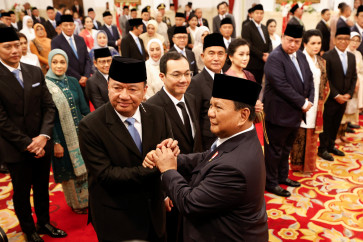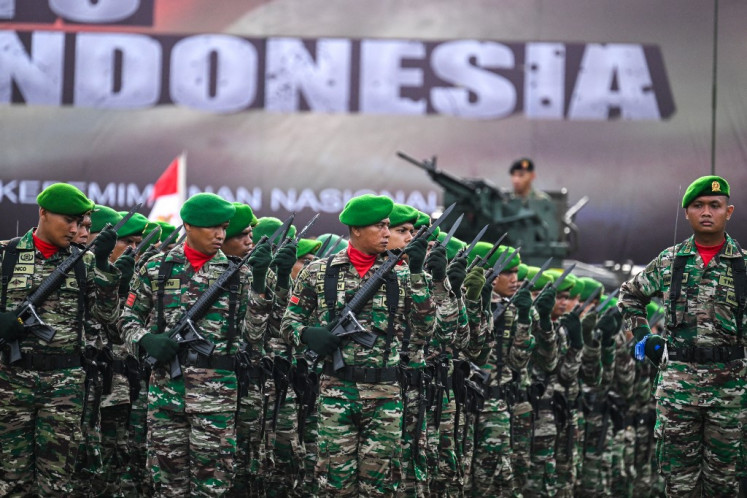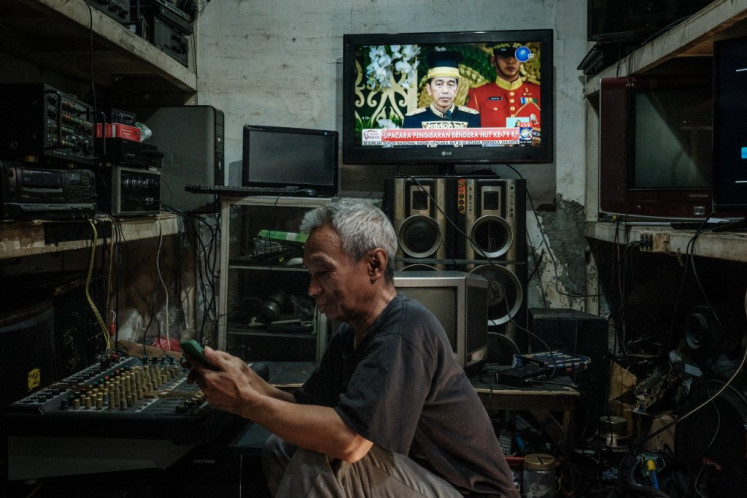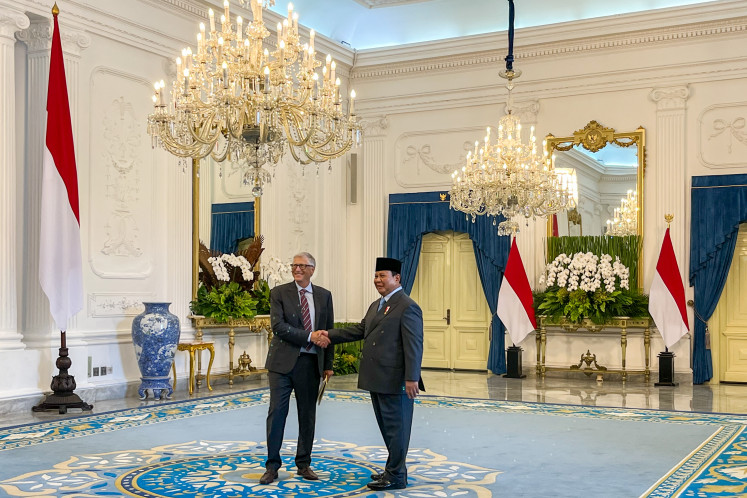Two movies to celebrate Pramoedya’s legacy
Allegiance: Set during the Japanese occupation of Indonesia during World War II, Perburuan (The Fugitive) follows an Indonesian soldier named Hardo (Adipati Dolken) who leads a nationalist army revolt
Change text size
Gift Premium Articles
to Anyone

A
llegiance: Set during the Japanese occupation of Indonesia during World War II, Perburuan (The Fugitive) follows an Indonesian soldier named Hardo (Adipati Dolken) who leads a nationalist army revolt.
The stakes are high for the upcoming movie adaptations of Bumi Manusia (This Earth of Mankind) and Perburuan (The Fugitive). They could bring Pramoedya Ananta Toer’s brilliance to a wider audience — or be great disappointments.
Director Hanung Bramantyo knows well that he cannot please everyone when it comes to movie adaptations, especially if they are based on a novel written by one of the most celebrated Indonesian authors, Pramoedya “Pram” Ananta Toer.
“Making a film of Pram’s work is beyond a job. It is a dedication,” he said in a press conference in Jakarta on July 4.
When Hanung was entrusted with adapting Bumi Manusia (This Earth of Mankind) — the first of Pramoedya’s beloved Buru tetralogy, the controversy started early on.
Many of Pramoedya’s readers and fans doubted that Hanung — indeed no single director — could do justice to the tetralogy. They were even more perplexed upon learning that teenage heartthrob Iqbaal Ramadhan and newcomer Mawar Eva De Jongh would take the lead roles of Minke and Annelies.
Hanung is no stranger to this kind of pressure. The renowned director has adapted many books, including the hit 2008 Islamic drama Ayat-Ayat Cinta (The Verses of Love).
Refusing to be shackled by people’s expectations, Hanung has freely added his own colors to the Bumi Manusia movie.
“The book is a work of fiction by Pram. Therefore, I believe we have the right to create our own fiction [for the movie adaptation].”
“We paint the house orange, we add colors to the town. We dress Nyai Ontosoroh [Annelies’ mother] in yellow dresses and the colorful motifs of northern coastal-style jarik [batik wrap],” the director said, adding that his visual interpretations were based on historical research into 18th century Surabaya, which is the story’s setting.
Hanung also ensured that the cast was not overwhelmed by their admiration for Pramoedya, who had been nominated several times for the Nobel Prize in literature.
“I told them not to look it as Pram’s work, but at Bumi Manusia in its entirety as a novel,” Hanung said.
“When I directed Sha Ine Febriyanti [who plays Nyai Ontosoroh], I told her to focus on the character’s pains and forget that the movie is based on a literary masterpiece.”

Capturing Pram’s soul
Falcon Pictures will release Bumi Manusia on Aug. 15, together with another adaptation of Pramoedya’s novel Perburuan (The Fugitive).
The movie is directed by Richard Oh, a well-known name in the indie scene who directed Koper (2006), Melancholy is a Movement (2015) and Terpana (2016).
Adipati Dolken, who gained fame through his romantic roles, will take the lead role of Hardo, an Indonesian soldier and platoon commander who becomes a fugitive following his botched revolt against the Japanese military during World War II.
“If the movie manages to capture the soul of Pramoedya, I’ll consider it a success,” Richard said.
Richard, who befriended Pram prior to his passing in 2006, has some ideas about what Perburuan the movie should achieve.
“I know Pram would want dialogue to shine in the film. That’s exactly what we’ve tried to do.”
Long road to silver screen
For about 20 years, many film producers have come to Pramoedya’s family to buy the film rights to Pramoedya’s works but most failed to produce the movies and the film rights expired.
Among those producers was renowned actor and director Deddy Mizwar, who bought the rights of Bumi Manusia and put Hanung in the director’s seat. The project was canceled after an investor stepped back.
The hope of Pramoedya’s family was renewed when Richard Oh and Falcon Pictures producers Frederica and HB Naveen proposed to adapt Gadis Pantai (The Girl from the Coast) into a movie.
“We finally took Perburuan following a recommendation from the family,” Frederica said.
Falcon Pictures went on to buy the film rights to Bumi Manusia.
“Both are masterpieces written when Pramoedya was in banishment. He took years to complete those works,” she said about the books, which were banned during Soeharto’s New Order regime given the writer’s affiliation with leftist groups.
Frederica said that Falcon Pictures might adapt the other books in the Buru quartet but for now it would focus on Bumi Manusia.
Pramoedya’s grandson Angga Okta Rahman expressed joy that his grandfather’s books would finally reach the silver screen.
“Pak Pram had always wanted his works adapted into movies. It is only 13 years after his passing that his wish has finally came true,” Angga said about his late grandfather.
Although both movies will hit theaters at the same time, Frederica is not worried that they will compete against each other.
“The way we see it [...] it is not a competition but a celebration. We don’t focus on whether the movies will reap a profit or not.” Frederica said. “The movies are our contributions to Indonesian cinema.”
But judging from some of the producers’ decisions — particularly in their cast choices, it is hard not to think that the movies, after all, are aimed at drawing large audiences, particularly among the younger generation. Though the movies may break the hearts of many Pramoedya admirers, the producers’ efforts to make the movies more mainstream are not entirely a bad idea.
At the press conference, throngs of teenagers screamed wildly upon seeing their idols — Iqbaal and Adipati — in the newly unveiled movie trailers. Soon, they will be watching the movies on theaters and (hopefully) realizing that there is more to the movies than simply pretty faces, tempting them to open Pramoedya’s books for themselves.
— Photos Courtesy of Falcon Pictures
___________________________
‘BUMI MANUSIA’

The book
Pramoedya told the Bumi Manusia (This Earth of Mankind) story to fellow prisoners on Buru prison island prison in the Maluku Islands because he had not been given permission to write. He finally wrote the book in 1975.
The book was published in 1980 and a year later was banned by order of the Attorney General. It is the first part of what later became known as the Buru quartet.
Pramoedya’s daughter, Astuti Ananta Toer, and a handful of Pramoedya admirers founded publishing house Lentera Dipantara and republished the book in 2005.
The complete tetralogy — Bumi Manusia, Anak Semua Bangsa (Child of All Nations), Jejak Langkah (Footsteps) and Rumah Kaca (House of Glass) — has been translated into 45 languages.
Bumi Manusia is still not on the list of books for compulsory reading in Indonesian schools, even since the New Order crumbled in 1998.
The Story
Set in the late 1890s during the Dutch colonial era, Bumi Manusia centers on Minke, a young Javanese minor royal, who attends an elite Dutch school. His world turns upside down after falling in love with Annelies, the daughter of Nyai Ontosoroh — a concubine of a Dutch man who overcomes various obstacles to be recognized by society.

The Movie
Director: Hanung Bramantyo
Main cast: Iqbaal Ramadhan, Mawar Eva De Jongh and Sha Ine Febriyanti
______________________
‘PERBURUAN’

The book
Pramoedya wrote Perburuan (The Fugitive) when he was in a Dutch forced-labor camp in 1947. The book was published in 1950 and, like many of Pramoedya’s other books, was banned by the New Order regime.
The Story
In the last days of the Japanese occupation of Indonesia during World War II, Hardo, a young Indonesian platoon commander, leads a nationalist army revolt that turns to be a failure. Hunted by Japanese soldiers, he disguises as a beggar and returns to his hometown in Java only to find out the bitter truth about his family and his lover Ningsih.

The Movie
Director: Richard Oh
Main cast: Adipati Dolken, Ayushita, Ernest Samudra, Khiva lshak and Michael Kho









